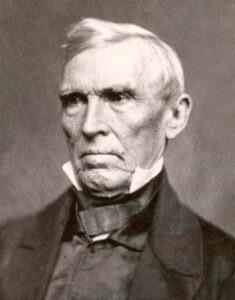Constitutional Union (nationalist) Senator John J. Crittenden, of the Commonwealth of Kentucky proposes the Compromise of 1860:
Six constitutional amendments to the Constitution:
- Amendment one – would restore the old Missouri Compromise line of 36 degrees, 30 minutes, between free and slave enclaves;
- Amendment two – Congress would be forbidden to abolish slavery in any place under its Article I, Section 8 [Clause 17] jurisdiction;
- Amendment three – Congress would be forbidden from abolishing slavery in the District of Columbia as long as it was allowed to exist in Maryland and Virginia;
- Amendment four – Congress would be forbidden from interfering in the interstate commerce in slaves;
- Amendment five – Congress would be permitted to pay compensation for fugitive slaves who had escaped into Canada;
- Amendment six – the preceding amendments may not be repealed, nor may Congress interfere with slavery in any State; also
Four Congressional resolutions:
- Resolution one – that the Fugitive Slave Act of 1850 is lawful, and should be vigorously enforced;
- Resolution two – that all State “personal liberty laws,” which interfered with enforced of the FSA of 1850 are unlawful and should be repealed;
- Resolution three – that the FSA of 1850 should be amended as to be more palatable to the free States;
- Resolution four – that the suppression of the international slave trade should be vigorously enforced.
Postscript: By the end of the month the Crittenden Compromise (of 1860) was dead in both houses of Congress.
[updated 1/17/2025]
Subsequent Events:
Authority:
Article I, Section 6 [Clause 1]
ccc-2point0.com/constitution-for-the-united-states
References:
Bruce Catton, The Civil War, (New York: American Heritage, 1960; Boston: Houghton-Mifflin, 1987), 282.
Calvin D. Linton, ed. The Bicentennial Almanac: 200 Years of America, 1776-1976, (Nashville, Tennessee: Thomas Nelson, 1975), 151.


